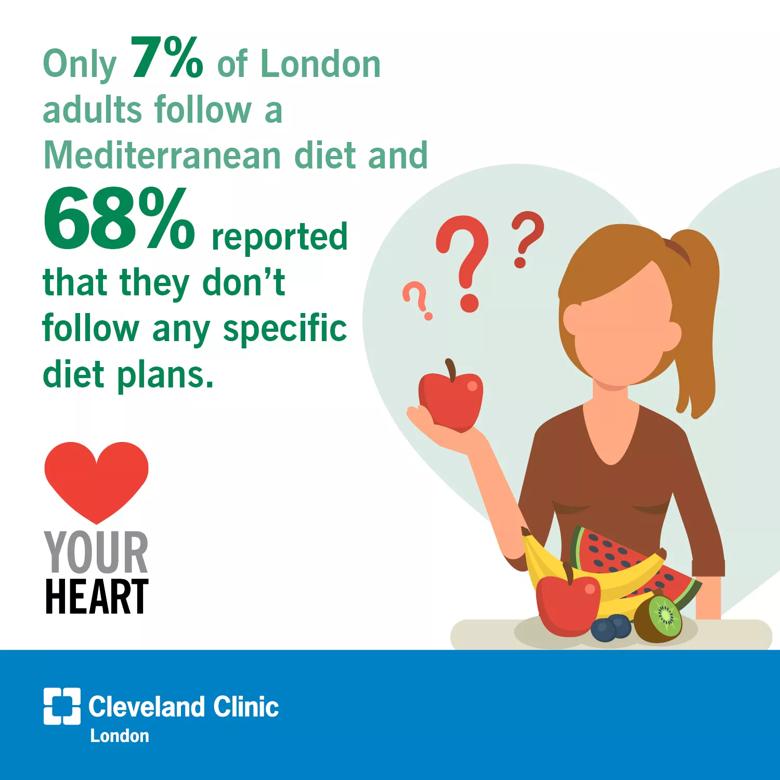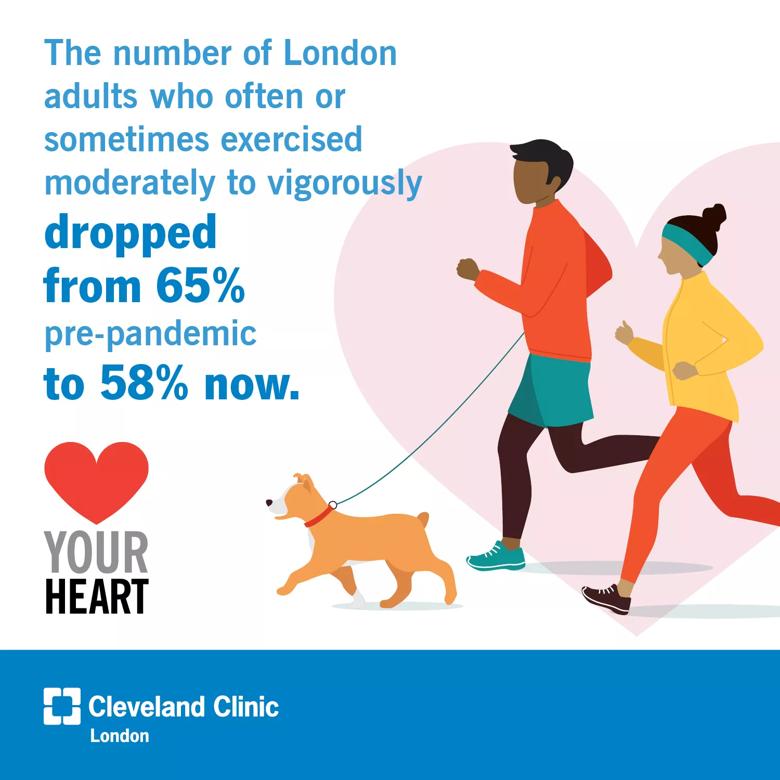Survey of adults published during National Heart Month also finds majority of Londoners can identify heart-healthy diets, but do not follow a specific diet

LONDON: A survey commissioned by Cleveland Clinic London, part of Cleveland Clinic’s global health system, found that adults in London reported a decrease in physical activity levels since the pandemic struck. The proportion of Londoners who said they never or rarely exercised moderately to vigorously rose from 35% pre-pandemic to 42% currently, while those who often walk throughout the day fell from 45% to 38%.

Image content: This image is available to view online.
View image online (https://assets.clevelandclinic.org/transform/7006a310-9829-410c-8b4b-4b534b1c9fcb/22-CCC-2729359-Lon1-1080x1080-1_jpg)
Older generations have seen a greater decline in physical activity since the onset of the COVID-19 pandemic with Boomers who sometimes or often undertook moderate to vigorous exercise falling from 61% pre-pandemic to 57% currently. Respondents aged between 18-25 reported only a 2 percentage point drop (61% pre-pandemic vs. 59% currently).
The survey also asked Londoners about their diet. The majority of adults in the capital can correctly identify heart-healthy diets, such as the Mediterranean diet (49%), but a majority do not follow any specific diet (68%).
When presented with a list of 10 diets, 49% of adults identified the Mediterranean diet as among the most heart-healthy, followed by a plant-based diet (26%) and a vegetarian diet including eggs and dairy (26%). In contrast, only 7% of Londoners follow a Mediterranean diet, 4% a plant-based diet and 10% a vegetarian diet, with 68% of Londoners reporting that they don’t follow any specific diets.
“A heart healthy diet coupled with regular physical activity is the best way to prevent heart disease. It is encouraging to find there is considerable awareness among adults on what constitutes a heart-healthy diet, but it is important that people follow healthy eating habits to help prevent heart disease,” said Bernard Prendergast, MD, chairman of Cardiology at Cleveland Clinic London.
The survey also investigated London adults’ knowledge of other factors that can increase risk of heart disease and found that the majority were able to identify key risk factors such as obesity (84%), smoking/vaping (78%), not exercising enough (72%), and high blood pressure (81%). However, many did not know that the following less-significant factors can increase risk for developing heart disease: lack of sleep (identified by 50%), poor dental health (identified by 32%) and over-exercising (identified by 22%).
“According to the British Heart Foundation, there are around 7.6 million people living with a heart or circulatory disease in the UK: 4 million men and 3.6 million women. Since we know that 90% of heart disease is preventable through a healthier diet, regular exercise, and not smoking, now is the time to put our knowledge into action and refocus on our heart health,” said Dr. Prendergast. “This is particularly important during the current global health crisis as our survey also shows a general decrease in activity levels after the onset of the COVID-19 pandemic.”

Image content: This image is available to view online.
View image online (https://assets.clevelandclinic.org/transform/63974f56-0354-4104-981a-d2b6563750c5/22-CCC-2729359-Lon2-1080x1080-1_jpg)
From the survey results, it appears that activity levels changed more during the pandemic than people’s diets, with the proportion of adults saying that they rarely or never followed a specific diet remaining relatively unchanged (69% pre-pandemic vs. 68% currently).
Cleveland Clinic, a global health system first established in the US in 1921, regularly commissions heart health surveys in various countries. The London survey was conducted at the end of last month and the results are being published to coincide with National Heart Month, an annual awareness initiative of the British Heart Foundation.
Cleveland Clinic is the No.1 hospital in the world for cardiac surgery, according to Newsweek’s World’s Best Specialized Hospitals of 2022. Cleveland Clinic has been ranked the No. 1 hospital in the country for cardiology and cardiac surgery for 27 years in a row by U.S. News & World Report.
Cleveland Clinic has been a leader in heart care since the 1940s, when Arda Green, M.D., and Irvine Page, M.D., led research teams that isolated serotonin and linked high blood pressure to heart disease.
Cleveland Clinic’s cardiac-related discoveries and “firsts” have continued since then. Cleveland Clinic has:
Survey methodology: All figures, unless otherwise stated, are from YouGov Plc. Total sample size was 1,024 adults. Fieldwork was undertaken between 18-20 January 2022. The survey was carried out online. The figures have been weighted and are representative of all London adults (aged 18+).
– ENDS –
About Cleveland Clinic London
Cleveland Clinic London hospital opens in spring 2022. It will have 184 inpatient beds, including 29 ICU beds; eight operating rooms; a full imaging suite; endoscopy and cardiac catheterisation laboratories; day case rooms for surgery; and a full neurological suite with rehabilitation. In addition to comprehensive cardiovascular and thoracic services, it will offer orthopaedics, digestive diseases, urology, neurosciences, ear, nose and throat, general surgery, general practice and executive health. Cleveland Clinic’s first healthcare facility in London, Cleveland Clinic Portland Place Outpatient Centre, opened in September 2021, and is equipped with the latest technology to enhance quality, safety and experience of care and offers a variety of outpatient services, including outpatient appointments, diagnostics (imaging, cardiac, neurophysiology), and general practice appointments.
Cleveland Clinic London is part of the Cleveland Clinic health system. Cleveland Clinic is a nonprofit multispecialty academic medical center that integrates clinical and hospital care with research and education. It was established in Cleveland, Ohio in 1921 by four renowned US physicians with a vision of providing outstanding patient care based upon the principles of cooperation, compassion and innovation. Overall the system has 70,800 employees worldwide, operates 19 hospitals with over 6,500 beds, more than 220 outpatient facilities, and has locations in southeast Florida; Las Vegas, Nevada; Toronto, Canada; Abu Dhabi, UAE; and now London, England.
About Cleveland Clinic
Cleveland Clinic is a nonprofit multispecialty academic medical center that integrates clinical and hospital care with research and education. Located in Cleveland, Ohio, it was founded in 1921 by four renowned physicians with a vision of providing outstanding patient care based upon the principles of cooperation, compassion and innovation. Cleveland Clinic has pioneered many medical breakthroughs, including coronary artery bypass surgery and the first face transplant in the United States. U.S. News & World Report consistently names Cleveland Clinic as one of the nation’s best hospitals in its annual “America’s Best Hospitals” survey. Among Cleveland Clinic’s 67,554 employees worldwide are more than 4,520 salaried physicians and researchers, and 17,000 registered nurses and advanced practice providers, representing 140 medical specialties and subspecialties. Cleveland Clinic is a 6,026-bed health system that includes a 165-acre main campus near downtown Cleveland, 19 hospitals, more than 220 outpatient facilities, and locations in southeast Florida; Las Vegas, Nevada; Toronto, Canada; Abu Dhabi, UAE; and London, England. In 2019, there were 9.8 million total outpatient visits, 309,000 hospital admissions and observations, and 255,000 surgical cases throughout Cleveland Clinic’s health system. Patients came for treatment from every state and 185 countries. Visit us at clevelandclinic.org. Follow us at twitter.com/ClevelandClinic. News and resources available at newsroom.clevelandclinic.org.
Editor’s Note: Cleveland Clinic News Service is available to provide broadcast-quality interviews and B-roll upon request.